HRM Assignment: Employee Engagement and Exit Interview Analysis
VerifiedAdded on 2023/06/08
|9
|1368
|247
Report
AI Summary
This report, prepared as part of a Human Resource Management (HRM) assignment, focuses on two key aspects of HRM: employee engagement surveys and exit interviews. The report begins by outlining the benefits of employee engagement surveys, including identifying issues like absenteeism and turnover, and improving employee morale. It presents a sample survey with questions designed to gauge employee attitudes towards various aspects of their work environment, company culture, and management. The second part of the report covers exit interviews, explaining their purpose and advantages, such as gathering feedback and retrieving company property. It also acknowledges potential drawbacks, like reluctance to share sensitive information. The report provides sample exit interview questions and a comprehensive questionnaire to gather information from departing employees. Finally, the report references sources used for the analysis and provides a detailed overview of the topics covered.
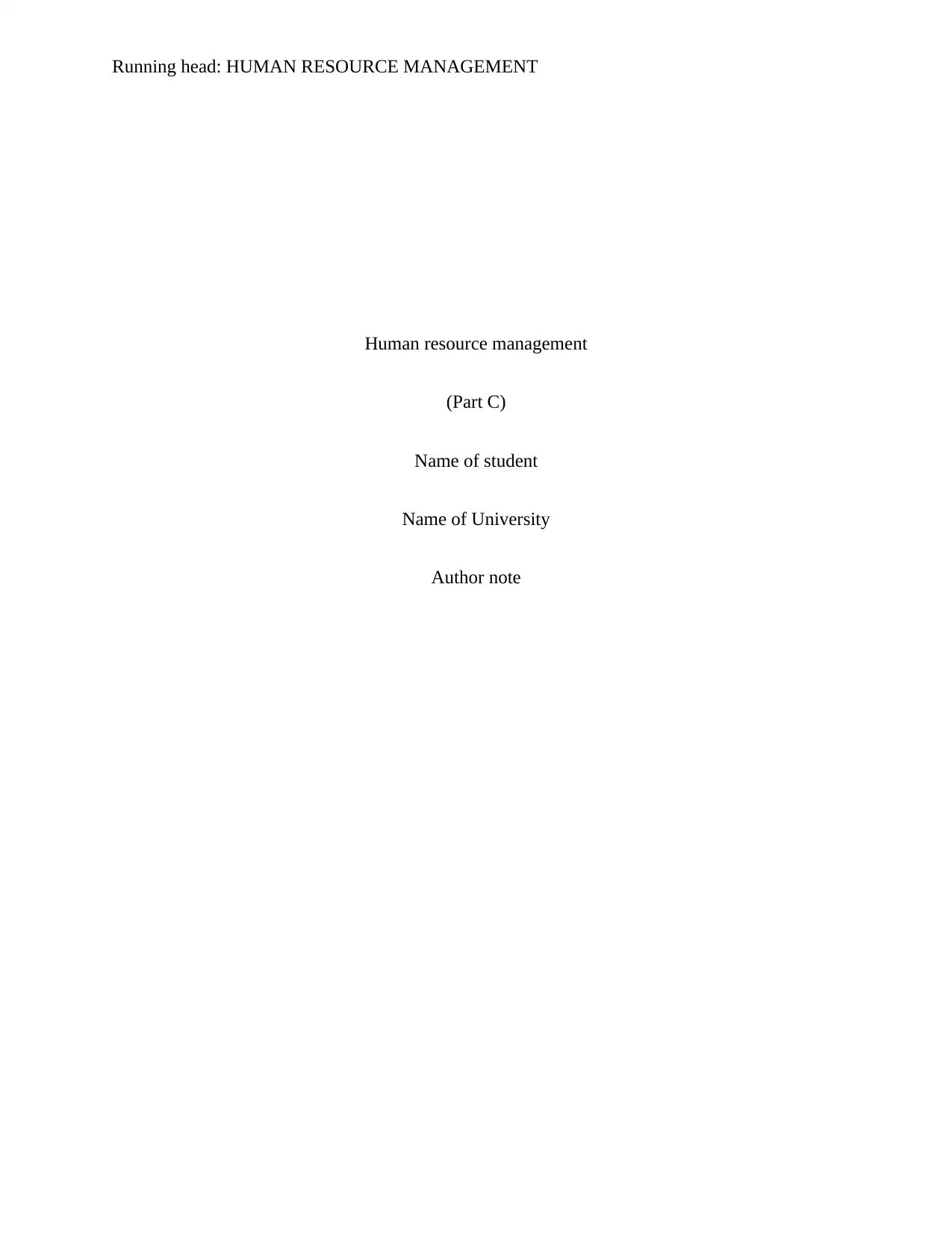
Running head: HUMAN RESOURCE MANAGEMENT
Human resource management
(Part C)
Name of student
Name of University
Author note
Human resource management
(Part C)
Name of student
Name of University
Author note
Paraphrase This Document
Need a fresh take? Get an instant paraphrase of this document with our AI Paraphraser
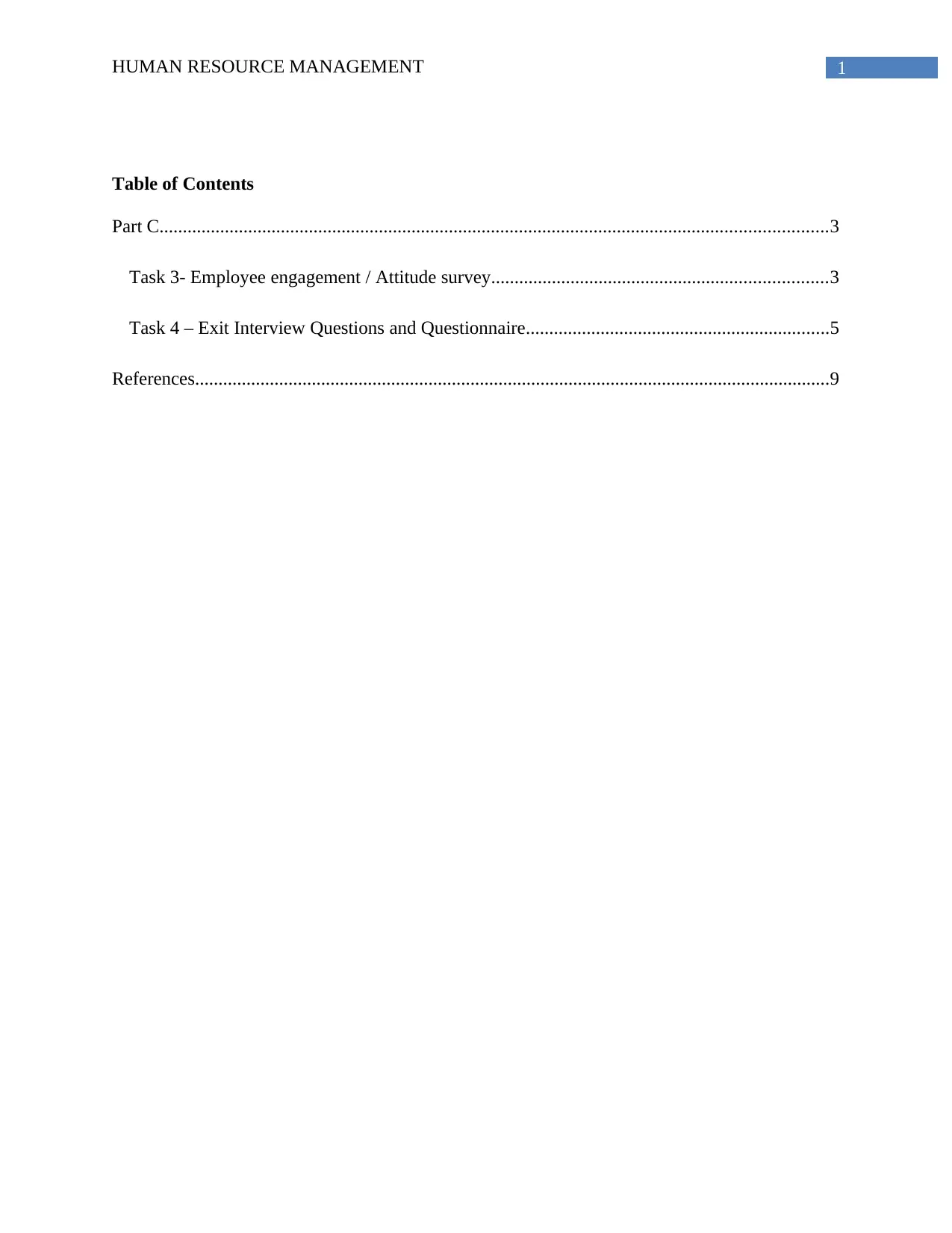
1HUMAN RESOURCE MANAGEMENT
Table of Contents
Part C...............................................................................................................................................3
Task 3- Employee engagement / Attitude survey........................................................................3
Task 4 – Exit Interview Questions and Questionnaire.................................................................5
References........................................................................................................................................9
Table of Contents
Part C...............................................................................................................................................3
Task 3- Employee engagement / Attitude survey........................................................................3
Task 4 – Exit Interview Questions and Questionnaire.................................................................5
References........................................................................................................................................9
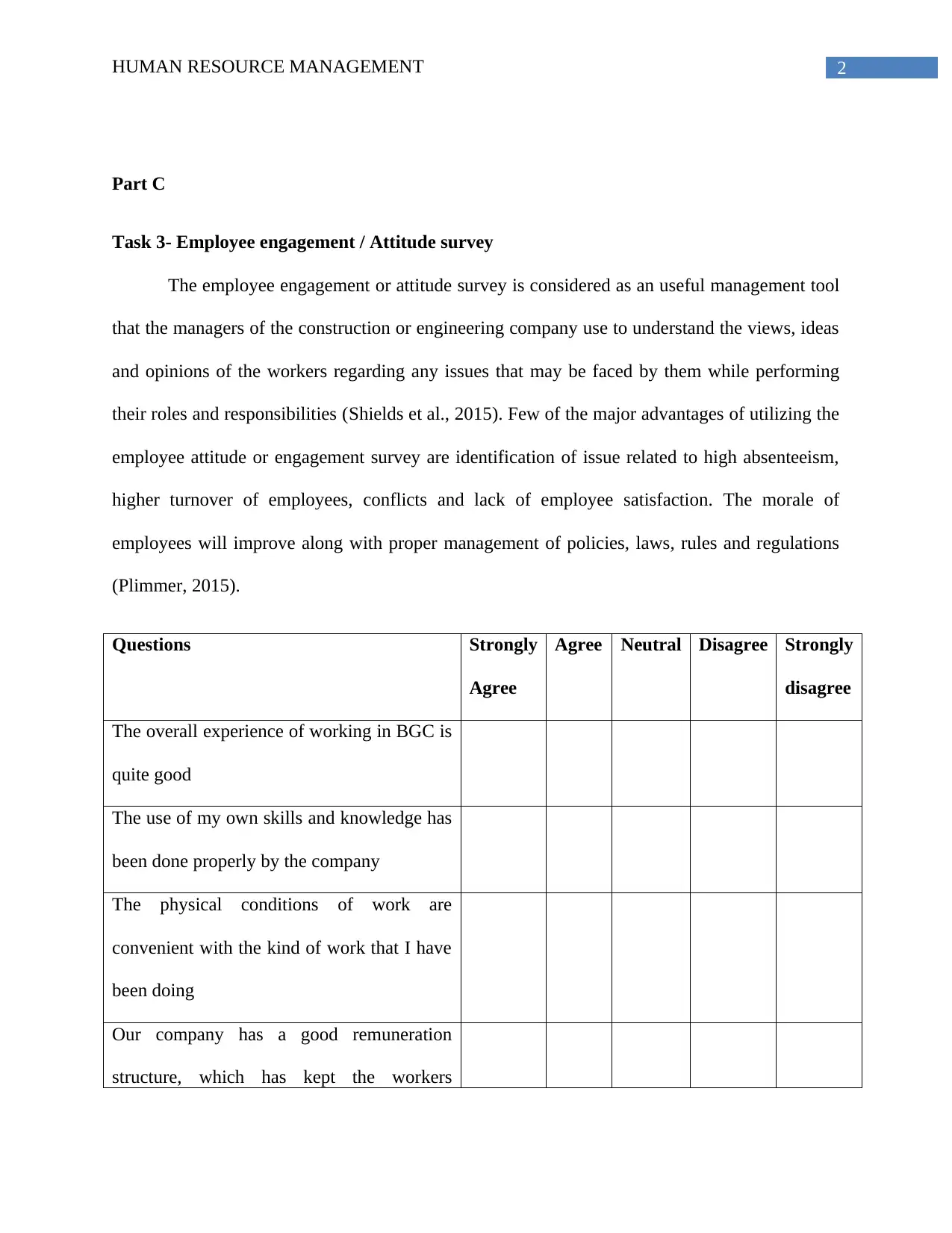
2HUMAN RESOURCE MANAGEMENT
Part C
Task 3- Employee engagement / Attitude survey
The employee engagement or attitude survey is considered as an useful management tool
that the managers of the construction or engineering company use to understand the views, ideas
and opinions of the workers regarding any issues that may be faced by them while performing
their roles and responsibilities (Shields et al., 2015). Few of the major advantages of utilizing the
employee attitude or engagement survey are identification of issue related to high absenteeism,
higher turnover of employees, conflicts and lack of employee satisfaction. The morale of
employees will improve along with proper management of policies, laws, rules and regulations
(Plimmer, 2015).
Questions Strongly
Agree
Agree Neutral Disagree Strongly
disagree
The overall experience of working in BGC is
quite good
The use of my own skills and knowledge has
been done properly by the company
The physical conditions of work are
convenient with the kind of work that I have
been doing
Our company has a good remuneration
structure, which has kept the workers
Part C
Task 3- Employee engagement / Attitude survey
The employee engagement or attitude survey is considered as an useful management tool
that the managers of the construction or engineering company use to understand the views, ideas
and opinions of the workers regarding any issues that may be faced by them while performing
their roles and responsibilities (Shields et al., 2015). Few of the major advantages of utilizing the
employee attitude or engagement survey are identification of issue related to high absenteeism,
higher turnover of employees, conflicts and lack of employee satisfaction. The morale of
employees will improve along with proper management of policies, laws, rules and regulations
(Plimmer, 2015).
Questions Strongly
Agree
Agree Neutral Disagree Strongly
disagree
The overall experience of working in BGC is
quite good
The use of my own skills and knowledge has
been done properly by the company
The physical conditions of work are
convenient with the kind of work that I have
been doing
Our company has a good remuneration
structure, which has kept the workers
⊘ This is a preview!⊘
Do you want full access?
Subscribe today to unlock all pages.

Trusted by 1+ million students worldwide
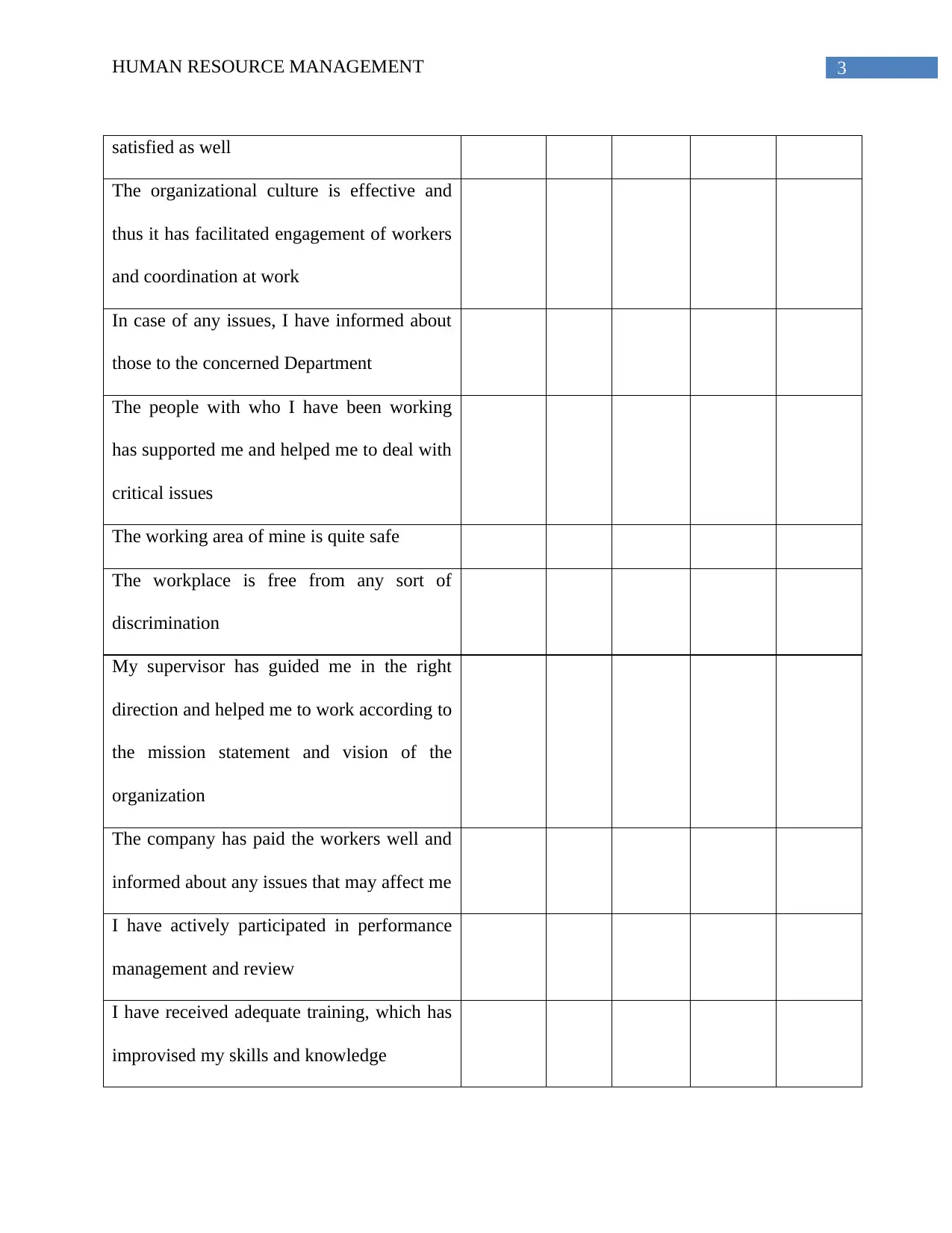
3HUMAN RESOURCE MANAGEMENT
satisfied as well
The organizational culture is effective and
thus it has facilitated engagement of workers
and coordination at work
In case of any issues, I have informed about
those to the concerned Department
The people with who I have been working
has supported me and helped me to deal with
critical issues
The working area of mine is quite safe
The workplace is free from any sort of
discrimination
My supervisor has guided me in the right
direction and helped me to work according to
the mission statement and vision of the
organization
The company has paid the workers well and
informed about any issues that may affect me
I have actively participated in performance
management and review
I have received adequate training, which has
improvised my skills and knowledge
satisfied as well
The organizational culture is effective and
thus it has facilitated engagement of workers
and coordination at work
In case of any issues, I have informed about
those to the concerned Department
The people with who I have been working
has supported me and helped me to deal with
critical issues
The working area of mine is quite safe
The workplace is free from any sort of
discrimination
My supervisor has guided me in the right
direction and helped me to work according to
the mission statement and vision of the
organization
The company has paid the workers well and
informed about any issues that may affect me
I have actively participated in performance
management and review
I have received adequate training, which has
improvised my skills and knowledge
Paraphrase This Document
Need a fresh take? Get an instant paraphrase of this document with our AI Paraphraser
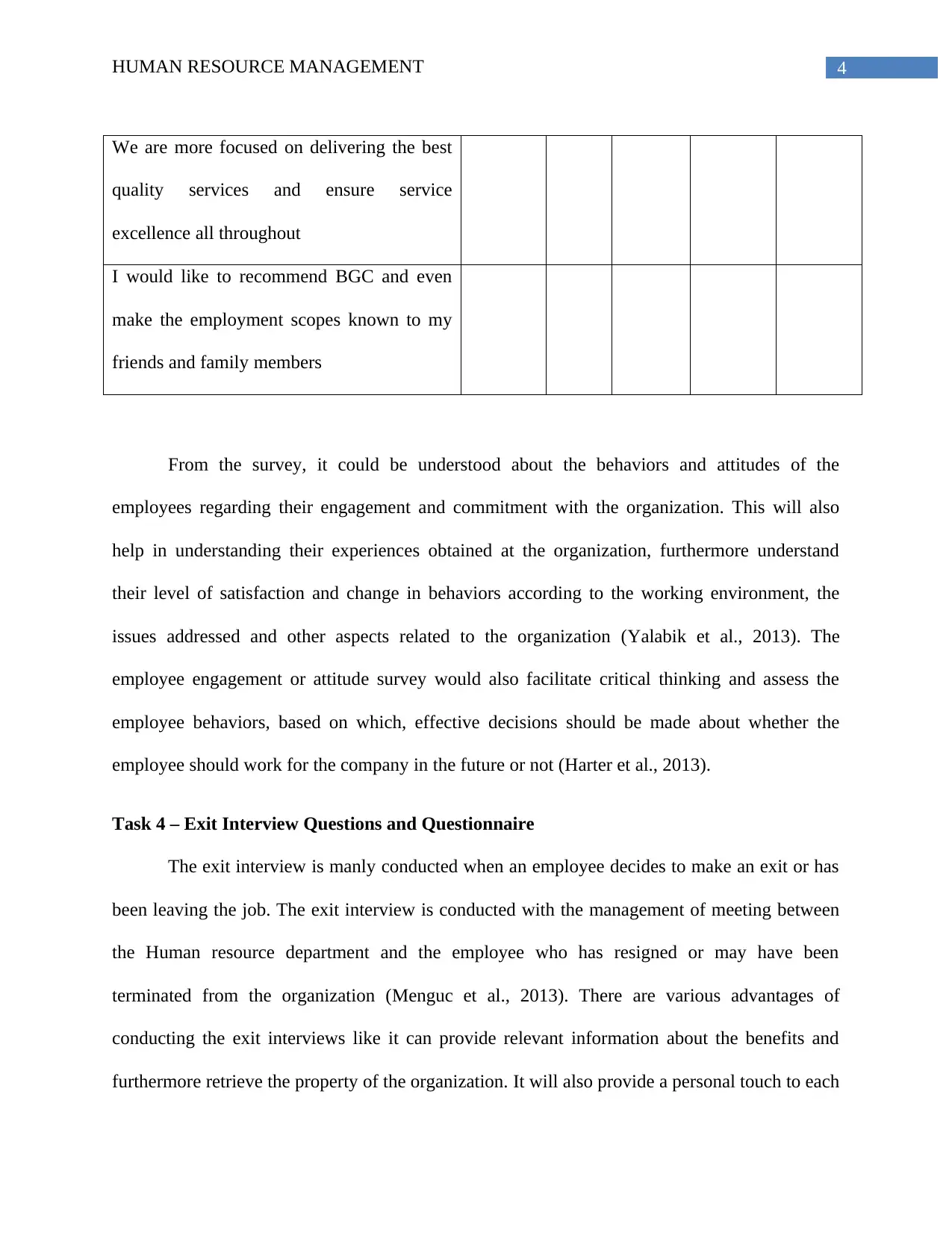
4HUMAN RESOURCE MANAGEMENT
We are more focused on delivering the best
quality services and ensure service
excellence all throughout
I would like to recommend BGC and even
make the employment scopes known to my
friends and family members
From the survey, it could be understood about the behaviors and attitudes of the
employees regarding their engagement and commitment with the organization. This will also
help in understanding their experiences obtained at the organization, furthermore understand
their level of satisfaction and change in behaviors according to the working environment, the
issues addressed and other aspects related to the organization (Yalabik et al., 2013). The
employee engagement or attitude survey would also facilitate critical thinking and assess the
employee behaviors, based on which, effective decisions should be made about whether the
employee should work for the company in the future or not (Harter et al., 2013).
Task 4 – Exit Interview Questions and Questionnaire
The exit interview is manly conducted when an employee decides to make an exit or has
been leaving the job. The exit interview is conducted with the management of meeting between
the Human resource department and the employee who has resigned or may have been
terminated from the organization (Menguc et al., 2013). There are various advantages of
conducting the exit interviews like it can provide relevant information about the benefits and
furthermore retrieve the property of the organization. It will also provide a personal touch to each
We are more focused on delivering the best
quality services and ensure service
excellence all throughout
I would like to recommend BGC and even
make the employment scopes known to my
friends and family members
From the survey, it could be understood about the behaviors and attitudes of the
employees regarding their engagement and commitment with the organization. This will also
help in understanding their experiences obtained at the organization, furthermore understand
their level of satisfaction and change in behaviors according to the working environment, the
issues addressed and other aspects related to the organization (Yalabik et al., 2013). The
employee engagement or attitude survey would also facilitate critical thinking and assess the
employee behaviors, based on which, effective decisions should be made about whether the
employee should work for the company in the future or not (Harter et al., 2013).
Task 4 – Exit Interview Questions and Questionnaire
The exit interview is manly conducted when an employee decides to make an exit or has
been leaving the job. The exit interview is conducted with the management of meeting between
the Human resource department and the employee who has resigned or may have been
terminated from the organization (Menguc et al., 2013). There are various advantages of
conducting the exit interviews like it can provide relevant information about the benefits and
furthermore retrieve the property of the organization. It will also provide a personal touch to each
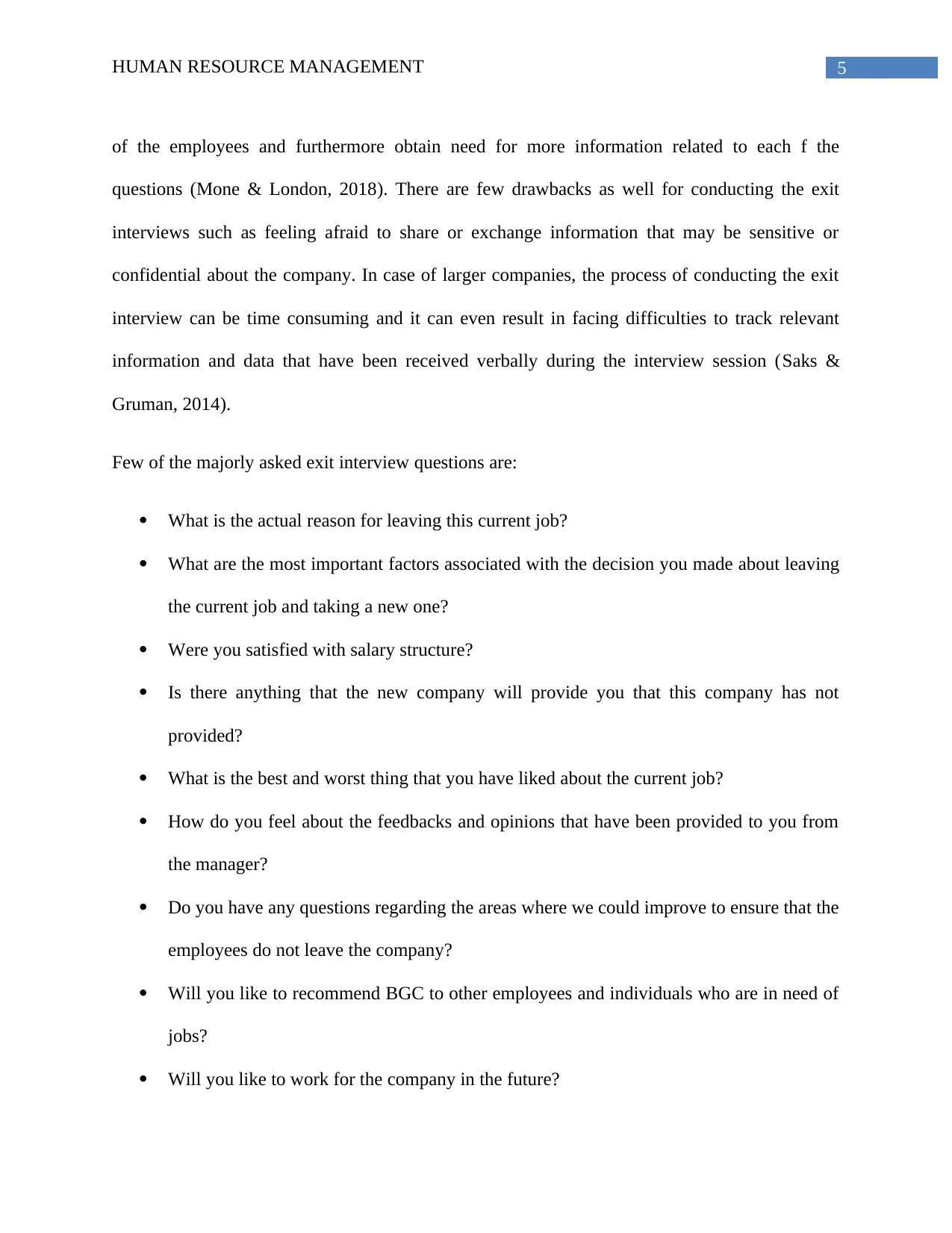
5HUMAN RESOURCE MANAGEMENT
of the employees and furthermore obtain need for more information related to each f the
questions (Mone & London, 2018). There are few drawbacks as well for conducting the exit
interviews such as feeling afraid to share or exchange information that may be sensitive or
confidential about the company. In case of larger companies, the process of conducting the exit
interview can be time consuming and it can even result in facing difficulties to track relevant
information and data that have been received verbally during the interview session (Saks &
Gruman, 2014).
Few of the majorly asked exit interview questions are:
What is the actual reason for leaving this current job?
What are the most important factors associated with the decision you made about leaving
the current job and taking a new one?
Were you satisfied with salary structure?
Is there anything that the new company will provide you that this company has not
provided?
What is the best and worst thing that you have liked about the current job?
How do you feel about the feedbacks and opinions that have been provided to you from
the manager?
Do you have any questions regarding the areas where we could improve to ensure that the
employees do not leave the company?
Will you like to recommend BGC to other employees and individuals who are in need of
jobs?
Will you like to work for the company in the future?
of the employees and furthermore obtain need for more information related to each f the
questions (Mone & London, 2018). There are few drawbacks as well for conducting the exit
interviews such as feeling afraid to share or exchange information that may be sensitive or
confidential about the company. In case of larger companies, the process of conducting the exit
interview can be time consuming and it can even result in facing difficulties to track relevant
information and data that have been received verbally during the interview session (Saks &
Gruman, 2014).
Few of the majorly asked exit interview questions are:
What is the actual reason for leaving this current job?
What are the most important factors associated with the decision you made about leaving
the current job and taking a new one?
Were you satisfied with salary structure?
Is there anything that the new company will provide you that this company has not
provided?
What is the best and worst thing that you have liked about the current job?
How do you feel about the feedbacks and opinions that have been provided to you from
the manager?
Do you have any questions regarding the areas where we could improve to ensure that the
employees do not leave the company?
Will you like to recommend BGC to other employees and individuals who are in need of
jobs?
Will you like to work for the company in the future?
⊘ This is a preview!⊘
Do you want full access?
Subscribe today to unlock all pages.

Trusted by 1+ million students worldwide
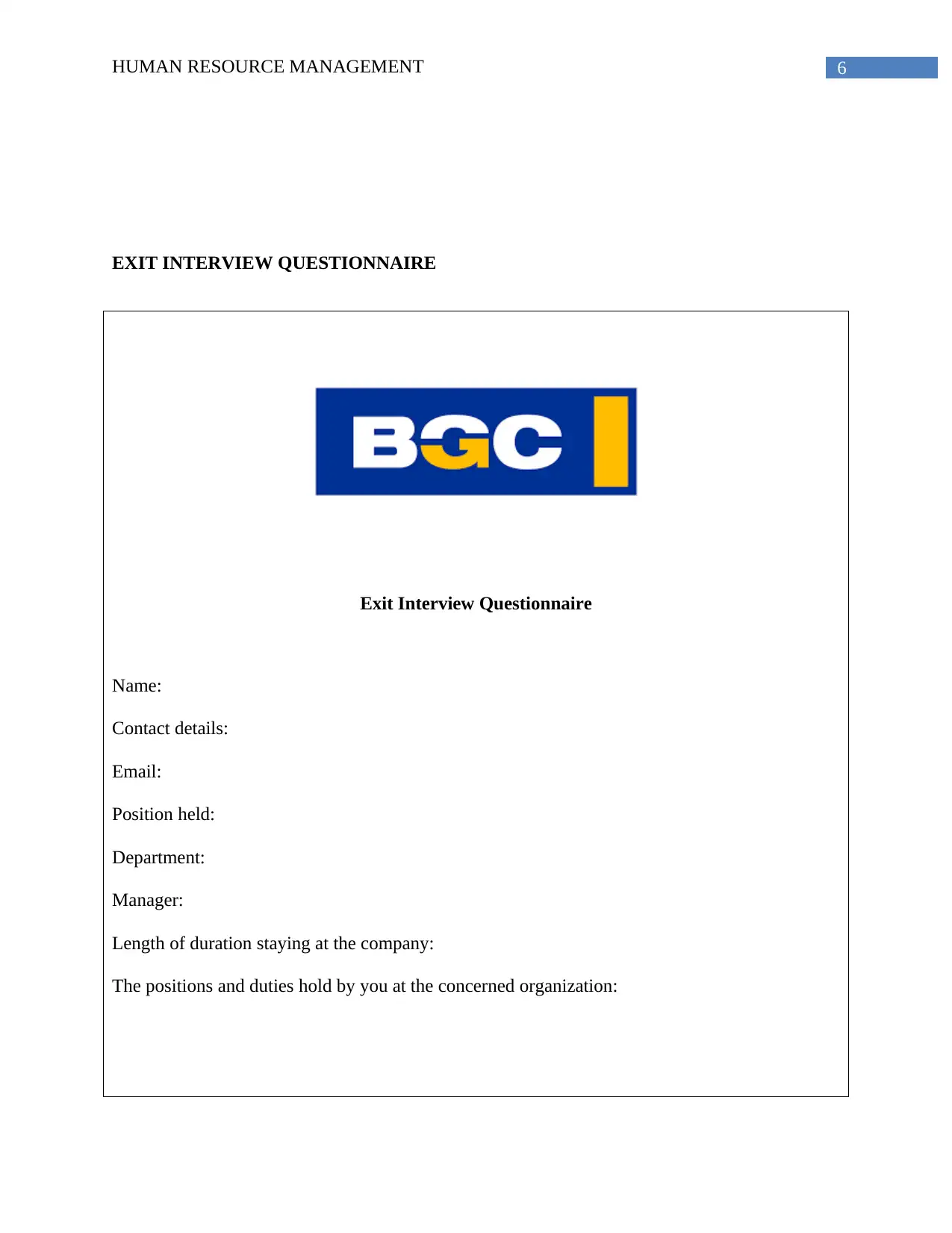
6HUMAN RESOURCE MANAGEMENT
EXIT INTERVIEW QUESTIONNAIRE
Exit Interview Questionnaire
Name:
Contact details:
Email:
Position held:
Department:
Manager:
Length of duration staying at the company:
The positions and duties hold by you at the concerned organization:
EXIT INTERVIEW QUESTIONNAIRE
Exit Interview Questionnaire
Name:
Contact details:
Email:
Position held:
Department:
Manager:
Length of duration staying at the company:
The positions and duties hold by you at the concerned organization:
Paraphrase This Document
Need a fresh take? Get an instant paraphrase of this document with our AI Paraphraser
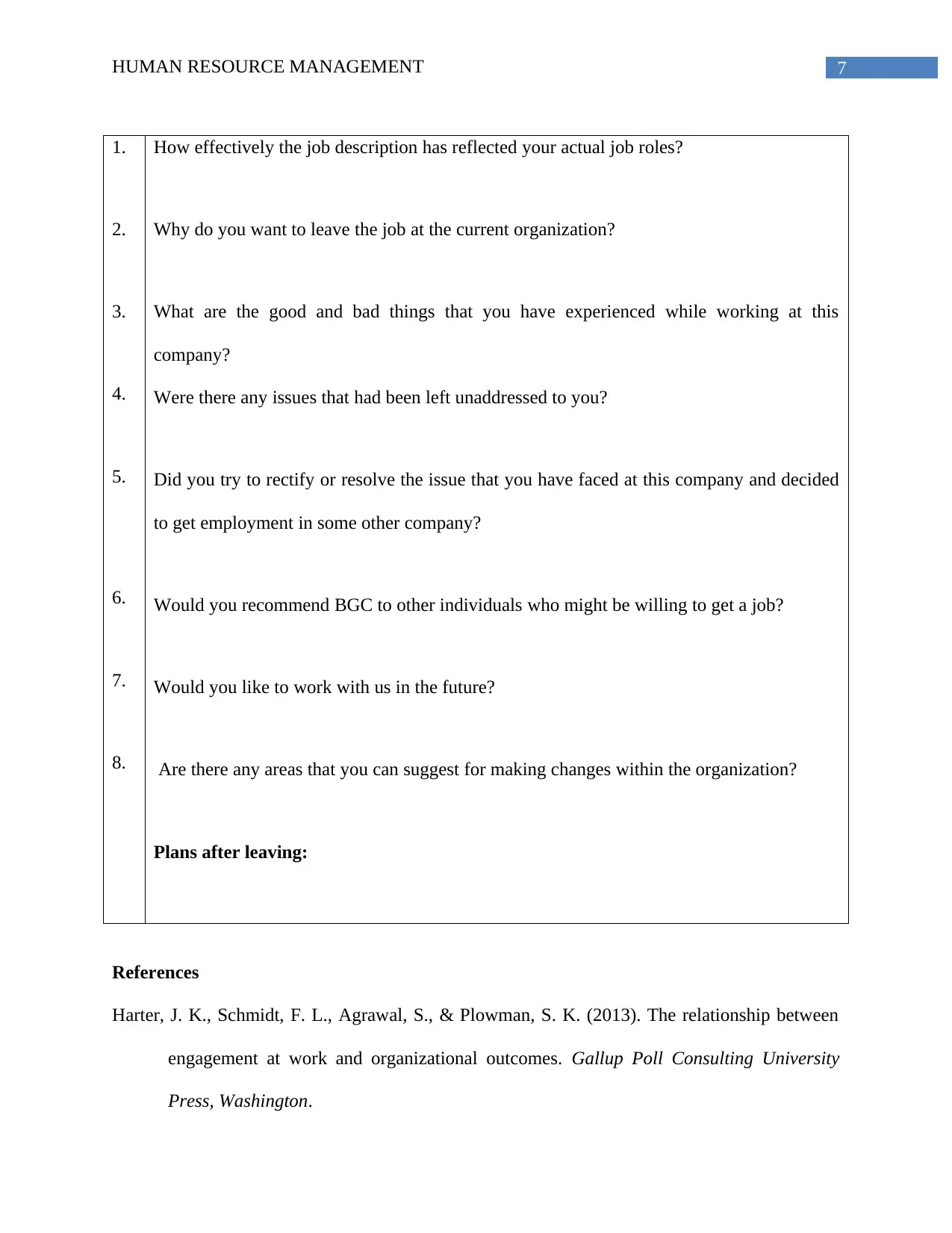
7HUMAN RESOURCE MANAGEMENT
1.
2.
3.
4.
5.
6.
7.
8.
How effectively the job description has reflected your actual job roles?
Why do you want to leave the job at the current organization?
What are the good and bad things that you have experienced while working at this
company?
Were there any issues that had been left unaddressed to you?
Did you try to rectify or resolve the issue that you have faced at this company and decided
to get employment in some other company?
Would you recommend BGC to other individuals who might be willing to get a job?
Would you like to work with us in the future?
Are there any areas that you can suggest for making changes within the organization?
Plans after leaving:
References
Harter, J. K., Schmidt, F. L., Agrawal, S., & Plowman, S. K. (2013). The relationship between
engagement at work and organizational outcomes. Gallup Poll Consulting University
Press, Washington.
1.
2.
3.
4.
5.
6.
7.
8.
How effectively the job description has reflected your actual job roles?
Why do you want to leave the job at the current organization?
What are the good and bad things that you have experienced while working at this
company?
Were there any issues that had been left unaddressed to you?
Did you try to rectify or resolve the issue that you have faced at this company and decided
to get employment in some other company?
Would you recommend BGC to other individuals who might be willing to get a job?
Would you like to work with us in the future?
Are there any areas that you can suggest for making changes within the organization?
Plans after leaving:
References
Harter, J. K., Schmidt, F. L., Agrawal, S., & Plowman, S. K. (2013). The relationship between
engagement at work and organizational outcomes. Gallup Poll Consulting University
Press, Washington.
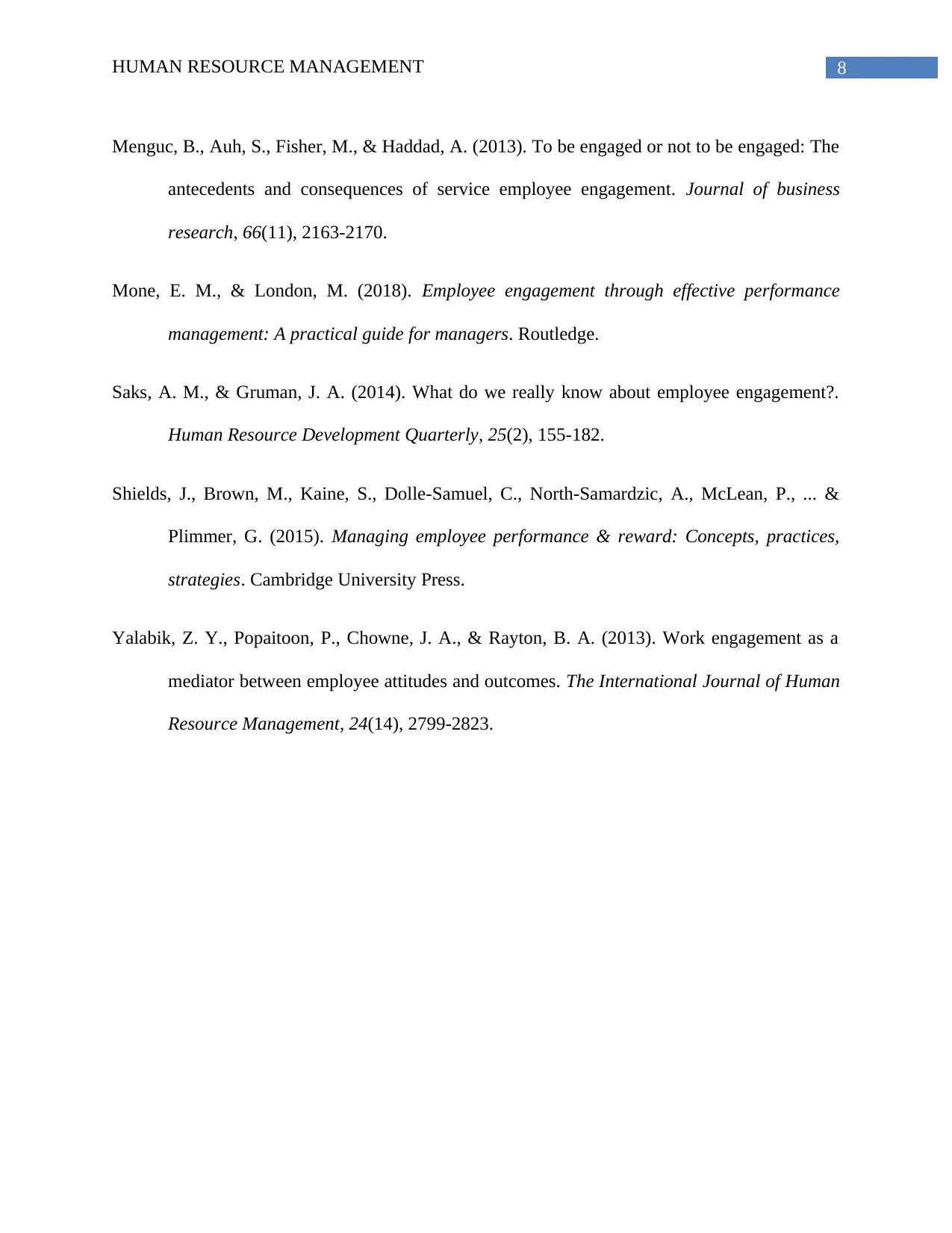
8HUMAN RESOURCE MANAGEMENT
Menguc, B., Auh, S., Fisher, M., & Haddad, A. (2013). To be engaged or not to be engaged: The
antecedents and consequences of service employee engagement. Journal of business
research, 66(11), 2163-2170.
Mone, E. M., & London, M. (2018). Employee engagement through effective performance
management: A practical guide for managers. Routledge.
Saks, A. M., & Gruman, J. A. (2014). What do we really know about employee engagement?.
Human Resource Development Quarterly, 25(2), 155-182.
Shields, J., Brown, M., Kaine, S., Dolle-Samuel, C., North-Samardzic, A., McLean, P., ... &
Plimmer, G. (2015). Managing employee performance & reward: Concepts, practices,
strategies. Cambridge University Press.
Yalabik, Z. Y., Popaitoon, P., Chowne, J. A., & Rayton, B. A. (2013). Work engagement as a
mediator between employee attitudes and outcomes. The International Journal of Human
Resource Management, 24(14), 2799-2823.
Menguc, B., Auh, S., Fisher, M., & Haddad, A. (2013). To be engaged or not to be engaged: The
antecedents and consequences of service employee engagement. Journal of business
research, 66(11), 2163-2170.
Mone, E. M., & London, M. (2018). Employee engagement through effective performance
management: A practical guide for managers. Routledge.
Saks, A. M., & Gruman, J. A. (2014). What do we really know about employee engagement?.
Human Resource Development Quarterly, 25(2), 155-182.
Shields, J., Brown, M., Kaine, S., Dolle-Samuel, C., North-Samardzic, A., McLean, P., ... &
Plimmer, G. (2015). Managing employee performance & reward: Concepts, practices,
strategies. Cambridge University Press.
Yalabik, Z. Y., Popaitoon, P., Chowne, J. A., & Rayton, B. A. (2013). Work engagement as a
mediator between employee attitudes and outcomes. The International Journal of Human
Resource Management, 24(14), 2799-2823.
⊘ This is a preview!⊘
Do you want full access?
Subscribe today to unlock all pages.

Trusted by 1+ million students worldwide
1 out of 9
Related Documents
Your All-in-One AI-Powered Toolkit for Academic Success.
+13062052269
info@desklib.com
Available 24*7 on WhatsApp / Email
![[object Object]](/_next/static/media/star-bottom.7253800d.svg)
Unlock your academic potential
Copyright © 2020–2026 A2Z Services. All Rights Reserved. Developed and managed by ZUCOL.





